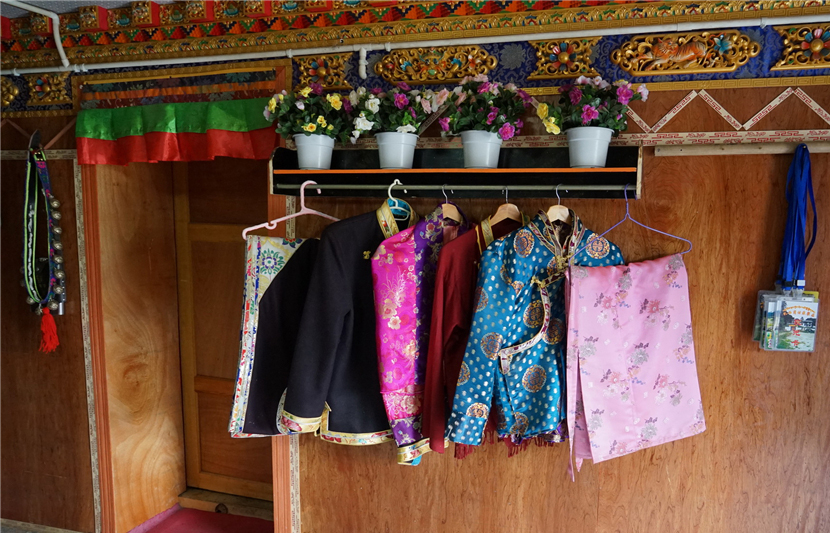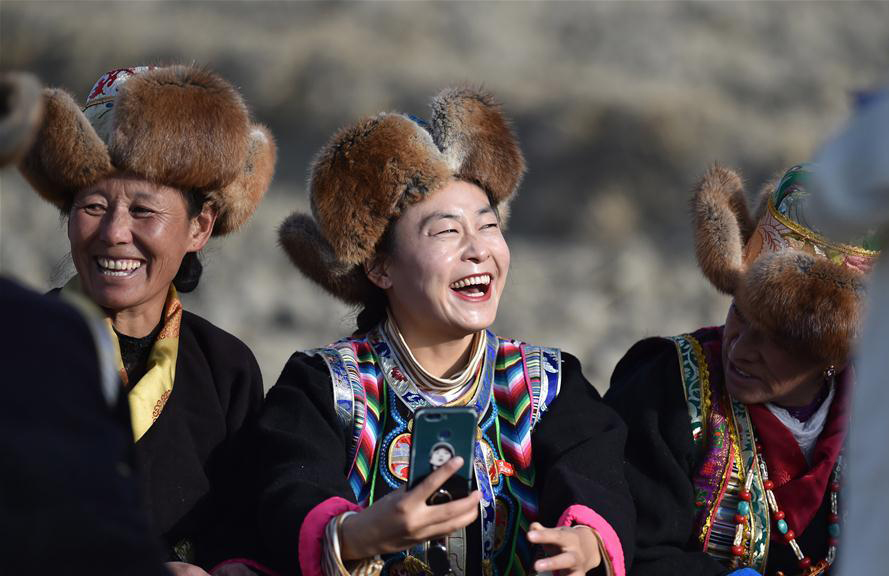From serf's son to political advisor
Political advisor Thubten Khedrup is confident about his proposals to be submitted on the ongoing annual "two sessions" in Beijing.
"Almost all of my proposals have been adopted and taken effect, or are being considered by authorities," the 55-year-old Tibetan man said.
As a member of the National Committee of the Chinese People's Political Consultative Conference (CPPCC), China's top political advisory body, Thubten Khedrup has presented nearly 200 proposals both at the regional level and national level since he was first elected as a regional political advisor of Tibet in 1998.
Down to Earth Proposals
Talking about his former proposals, Thubten Khedrup was proud to mention selecting Tibetan antelope as one of the five mascots of the 2008 Beijing Olympic Games.
"I first presented the proposal in 2003 and continued to submit it in 2004. Finally, I made it," Thubten Khedrup said. "To come up with the 1,000-word proposal, I consulted a dozen conservators and experts on the Tibetan antelope -- a barometer of the environment of the Qinghai-Tibet Plateau.
The adoption of the proposal not only made the rare species widely known to the world but also drew global attention to Tibet and its climate change.
Ten years after he submitted the proposal of launching doctoral degree program in Tibet, three doctoral degree programs on the regional economy, ecology of Tibet and Tibetan language were opened in Tibet University in 2013.
His proposals had not come out of wild thinking in the office, but were based on the stories he learned from ordinary Tibetan people and massive field research data collected by his research team.
To learn the latest data on Tibetan living conditions, Thubten Khedrup has visited countless households, temples, monasteries in almost every county in Tibet.
Because of a serious car accident which nearly took his life in 2002, Thubten Khedrup has raised the proposal of promoting Tibetan medicine.
Sustaining blood stasis in the head, Thubten Khedrup was in a state of coma but miraculously woke up after his mother gave him Tibetan medicine.
After five years' treatment with Tibetan medicine, he has recovered and returned to work.
As a political advisor at the national level, he observed the nation's development with a Tibetan perspective and came up with proposals that allow Tibet learning from other provinces' experience.
To write a proposal on how Tibet can woo tourists in the winter low-season, Thubten Khedrup visited China's southernmost island province of Hainan and northeast China's "ice city" of Harbin to gain experience.
Son of Tibet
Thubten Khedrup was among over 2,000 political advisors attending the second session of the 13th National Committee of the CPPCC.
The CPPCC National Committee members are people from various backgrounds including scientists, officials, entrepreneurs, artists and religious figures. They gather at the annual session to discuss major political, economic and social issues.
"Political advisor is not only an honor, but also a responsibility," he said.
He seems proud of another identity -- a son of Tibet. "I even use it as my screen name," he said.
Born in a herdsman's family in Jomda County in the city of Qamdo, Thubten Khedrup has always remained grateful that he has lived up to his dream to become a teacher, now a professor at Tibet University in Lhasa, capital of southwest China's Tibet Autonomous Region.
"I am the son of one of the 1 million serfs who were emancipated with the help of the Communist Party of China 60 years ago," Tubten Khedrup said. "Thanks to the CPC, I can be what I am today."
After graduating from the Southwest Normal University in Chongqing Municipality in 1988, Thubten Khedrup had many chances to work in coastal provinces. However, he was desperate to go back to Tibet to work as a teacher, even if it were a primary school teacher in a remote town.
"We Tibetan people highly appreciate teaching because teacher means wisdom," he said.
Luckily, he found a job at Tibet University. From then on, he researched the practical problems of Tibet while sharing his findings with the government and his students for over 30 years.
Brought up in the plateau region, Thubten Khedrup developed great interest in any topic related to Tibet when he was a college student.
"I am eager to know more about Tibet, and hope it could become better," Thubten Khedrup said. "So finding problems in the development of Tibet and coming up with solutions is how I fulfill my obligation as a political advisor."
As an expert of regional economy and tourism of Tibet, Thubten Khedrup have visited many places, both domestic and overseas, since 2008.
Thubten Khedrup can never forget a trip to France in 2010 when he was challenged by a group of foreigners on the human rights situation in Tibet.
"I'm a teacher and like to answer questions," Thubten Khedrup told the skeptics. "I would like to teach you that human rights include the right to live and to develop. Instead of preaching, I will give you an example: I myself am the son of a serf in old Tibet. If today's Tibet were as bad as what you described, how could I sit here to have a meeting with you in France?"
"Tibetan people should have the confidence to pursue their happiness, never mind what others say," he said.
At the beginning, he found overseas Tibetan people had doubts about the situation in Tibet. Gradually, they have learned the rapid development of Tibet from TV and friends. Some even envy the people living in Tibet and regret living in exile.
Tibet Story Teller
To tell Tibet's story to more people is his incentive to be a political advisor.
Anyone who intends to apply for either a Ph.D. or postgraduate position supervised by Thubten Khedrup should meet his three requirements: know Tibet, thank Tibet and serve Tibet.
"Serving Tibet does not mean they have to stay in Tibet forever. They can go anywhere after graduation. Wherever they go, they will tell stories of Tibet to help more people know Tibet," he said.
Tibetan people are living a harmonious life now. Lhasa's public security conditions are among the best in the world, he said.
"In Lhasa, you don't have to carry your packsack in front of your chest, as people do in some other places," he noted. "People in Tibet respect doctors and teachers. You rarely see medical dispute here. Women taxi drivers dare to drive at midnight."
"As a Tibetan man born in early 1960s, my own story reflects Tibet's change and development over the past 60 years since the democratic reform in 1959."
Now, Thubten Khedrup has nine Ph.D. students from different ethnic minority groups of China. Some of his previous students graduated from postgraduate school of China's top university --Tsinghua University or prominent universities in the world, including LSE in the UK.
"To know Tibet well and tell Tibet's story well, I still have a long way to go," he said.
Tibet Stories

Six wishes of a "horseback doctor"
Tamdrintso said that she hopes the state shall issue policies for village doctors in remote ...







